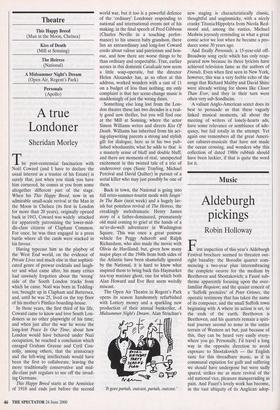Theatre
This Happy Breed (Man in the Moon, Chelsea) Kiss of Death (Mill at Sonning) The Heiress (National)
A Midsummer Night's Dream (Open Air, Regent's Park)
Personals (Apollo)
A true Londoner
Sheridan Morley
The post-centennial fascination with Noel Coward (and I have to declare the usual interest as a trustee of his Estate) is surely that, just when you think you have him cornered, he comes at you from some altogether different part of the stage. When his This Happy Breed, now in an admirable small-scale revival at the Man in the Moon in Chelsea (its first in London for more than 20 years), originally opened back in 1943, Coward was widely attacked for apparently patronising the lower-mid- dle-class citizens of Clapham Common. For once, he was then engaged in a press battle where all the cards were stacked in his favour.
Having typecast him as the playboy of the West End world, on the evidence of Private Lives and much else in that sophisti- cated genre of prewar cocktails and laugh- ter and what came after, his many critics had unwisely forgotten about the 'wrong' side of the South London tracks from which he came. Noel was born in Tedding- ton, brought up in Clapham and Battersea, and, until he was 25, lived on the top floor of his mother's Pimlico boarding-house.
In those years, the first third of his life, Coward came to know and love South Lon- doners as no other playwright of his time; and when just after the war he wrote the long-lost Peace In Our Time, about how London would have behaved under Nazi occupation, he reached a conclusion which enraged Graham Greene and Cyril Con- nolly, among others, that the aristocracy and the left-wing intellectuals would have been the first to collaborate, leaving the more traditionally conservative and mid- dle-class pub regulars to see off the invad- ing Germans.
This Happy Breed starts at the Armistice of 1918 and ends just before the second world war, but it too is a powerful defence of the 'ordinary' Londoner responding to national and international events not of his making; in the final speech of Fred Gibbons (Charles Neville in a touching perfor- mance) to his unseen baby grandson, there lies an extraordinary and long-lost Coward credo about valour and patriotism and hon- our, and how there are worse things to be than ordinary and respectable. True, earlier scenes in this domestic Cavalcade now seem a little soap-operatic, but the director Helen Alexander has, as so often at this address, worked wonders with a cast of 11 on a budget of less than nothing; my only complaint is that her scene-change music is maddeningly of just the wrong dates.
Something else long lost from the Lon- don theatre these last two decades is a real- ly good new thriller, but you will find one at the Mill at Sonning, where the actor Simon Williams writes and directs Kiss Of Death. Williams has inherited from his act- ing-playwriting parents a strong and stylish gift for dialogue, here as in his two pub- lished whodunnits; what he adds to that is a masterly sense of bluff and double bluff, and there are moments of real, unexpected excitement in this twisted tale of a trio of undercover cops (Susie Trayling, Michael Percival and David Quilter) in pursuit of a serial killer who may just possibly be one of them.
Back in town, the National is going into full retro-summer-tourist mode with Singin' In The Rain (next week) and a hugely lav- ish but pointless revival of The Heiress, the creakingly melodramatic Henry James story of a father-dominated, prematurely old maid coming to grief at the hands of a ne'er-do-well adventurer in Washington Square. This was once a great postwar vehicle for Peggy Ashcroft and Ralph Richardson, who also made the movie with Olivia de Havilland; but, given how many major plays of the 1940s from both sides of the Atlantic have been shamefully ignored by the National, it is hard to know what inspired them to bring back this Haymarket tea-tray matinee ghost, one for which both Alan Howard and Eve Best seem weirdly miscast.
The Open Air Theatre in Regent's Park opens its season handsomely refurbished with Lottery money and a sparkling new production of their annual bankroller, A Midsummer Night's Dream. Alan Strachan's `It goes pariah, outcast, pariah, outcast.' new staging is characteristically classic, thoughtful and ungimmicky, with a nicely cranky Titania/Hippolyta from Nicola Red- mond and, among the rustics, Michael Medwin joyously reminding us what a great comic actor we lost when he became a pro- ducer some 30 years ago.
And finally Personals, a 15-year-old off- Broadway song cycle which has only reap- peared now because its three lyricists have achieved television fame as the authors of Friends. Even when first seen in New York, however, this was a very feeble echo of the songs that Richard Maltby and David Shire were already writing for shows like Closer Than Ever, and they in their turn were often very sub-Sondheim.
A valiant Anglo-American sextet does its best to persuade us that these vaguely linked musical moments, all about the meeting of writers of lonely-hearts ads, have some relevance or semblance of ade- quacy, but fail totally in the attempt. Yet again one remembers all the great Ameri- can cabaret-musicals that have not made the ocean crossing, and wonders why this collection of dated 1980s rubbish should have been luckier, if that is quite the word for it.


































































 Previous page
Previous page